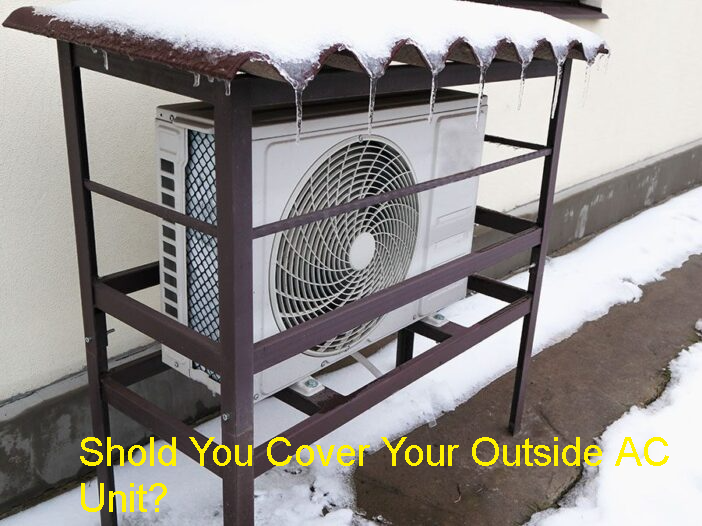Here’s the ultimate in-depth guide on whether you should cover your outdoor AC unit (condenser unit)—cover types, risks, benefits, best practices, and expert recommendations.
Should You Cover Your Outdoor AC Unit?
Covering your outside air conditioner unit can be helpful in some cases but harmful in others. It depends on climate, cover material, and the time of year. Let’s break it down in detail.

✅ When Covering Your AC Unit is GOOD
1️⃣ Winter Protection (Snow & Ice Prevention)
- In regions with harsh winters, heavy snow, freezing rain, and hail can damage the condenser coils and fan.
- Ice buildup on the unit can lead to bent fins and frozen parts, reducing efficiency.
- Solution:
- Use a breathable AC cover designed for winter protection.
- Avoid plastic or fully sealed covers that trap moisture.
2️⃣ Fall Protection (Leaves & Debris Prevention)
- If your AC unit is under trees, leaves, twigs, dirt, and seeds can fall inside.
- This debris clogs the condenser coils, reducing airflow and efficiency.
- Solution:
- Use a top-only cover or mesh cover to block debris while maintaining airflow.
3️⃣ Hail & Storm Protection
- Large hailstones can dent the AC unit’s metal fins and housing, affecting cooling performance.
- Strong winds can blow branches, rocks, or debris against the unit.
- Solution:
- Use a hail guard or custom-fitted AC cover with side vents.
4️⃣ Protecting a Non-Operational Unit
- If your AC unit won’t be used for months (e.g., summer home, vacation property), covering it prevents dust buildup and UV damage.
- Solution:
- Use a breathable, weatherproof cover and check the unit monthly for trapped moisture.
❌ When Covering Your AC Unit is BAD (And Can Cause Damage!)
1️⃣ Moisture Buildup → Rust & Corrosion Risk
- A fully covered AC unit can trap condensation, especially in humid or rainy climates.
- Moisture inside the unit causes rust, damaging internal components.
- Why?
- Your outdoor AC unit is designed to withstand rain and snow.
- Covering it traps water instead of letting it evaporate.
- Solution:
- Use a breathable cover with air vents to prevent moisture buildup.
2️⃣ Rodents & Pests Nesting Inside
- A covered AC unit creates a warm, protected shelter for mice, rats, and insects.
- Rodents may chew on electrical wires and damage internal parts.
- Signs of a Rodent Infestation:
- Chewed wires
- Nesting materials inside the unit
- Unusual smells or droppings
- Solution:
- Use a top-only cover to block debris but leave the sides open for ventilation.
- Avoid storing birdseed, pet food, or trash near the AC unit.
3️⃣ Overheating in Summer (BIG Mistake!)
- Never cover the unit in hot weather while the AC is running.
- A covered unit traps heat, making the compressor work harder.
- This leads to higher energy bills, overheating, and even system failure.
- Solution:
- Only cover the AC unit in winter or during off-seasons.
4️⃣ Mold & Mildew Growth
- A fully sealed cover blocks air circulation, leading to mold and mildew inside.
- Mold inside the unit can spread through ductwork, reducing indoor air quality.
- Solution:
- Choose a cover with breathable fabric and ventilation panels.
🔍 What Type of Cover is Best?
| Cover Type | Best For | Pros | Cons |
|---|---|---|---|
| Top-Only Cover | Fall & debris protection | Blocks leaves, allows airflow | Doesn’t protect from snow or hail |
| Mesh Cover | Year-round use | Prevents debris, allows airflow | Limited winter protection |
| Full Cover (Ventilated) | Winter & storm protection | Shields from snow, hail, and debris | Can trap moisture if not breathable |
| Plastic Tarp (BAD IDEA) | None | Cheap | Traps moisture, promotes rust & mold |
🌡 Expert HVAC Recommendations: What Should You Do?
✅ Best Practices:
✔ Use a breathable, top-only cover to block leaves & debris.
✔ Keep the sides open for airflow to prevent moisture buildup.
✔ If using a full cover, choose one with air vents to prevent condensation.
✔ Check the unit regularly for signs of rust, mold, or pests.
❌ What NOT to Do:
🚫 Don’t use a plastic tarp or completely sealed cover.
🚫 Don’t cover the AC unit in spring or summer when it’s running.
🚫 Don’t leave a cover on for too long without checking for moisture.
🏆 Final Verdict: Should You Cover Your AC Unit?
✔ Cover it IF:
✅ You live in an area with heavy snow, hail, or falling debris.
✅ Your AC unit sits under trees, and leaves clog the coils.
✅ You won’t be using the unit for months at a time.
❌ Don’t cover it IF:
🚫 You live in a humid climate where condensation builds up.
🚫 You plan to use the AC during warmer months.
🚫 You’re using a non-breathable cover that traps moisture.
🔧 Final Pro Tips
💡 Want the best of both worlds? Use a top-only cover in the fall to block leaves, then remove it before winter.
💡 Live in a snowy area? Use a full ventilated cover or a hail guard to prevent damage.
💡 Avoid overheating! Never cover an AC unit in warm weather.
